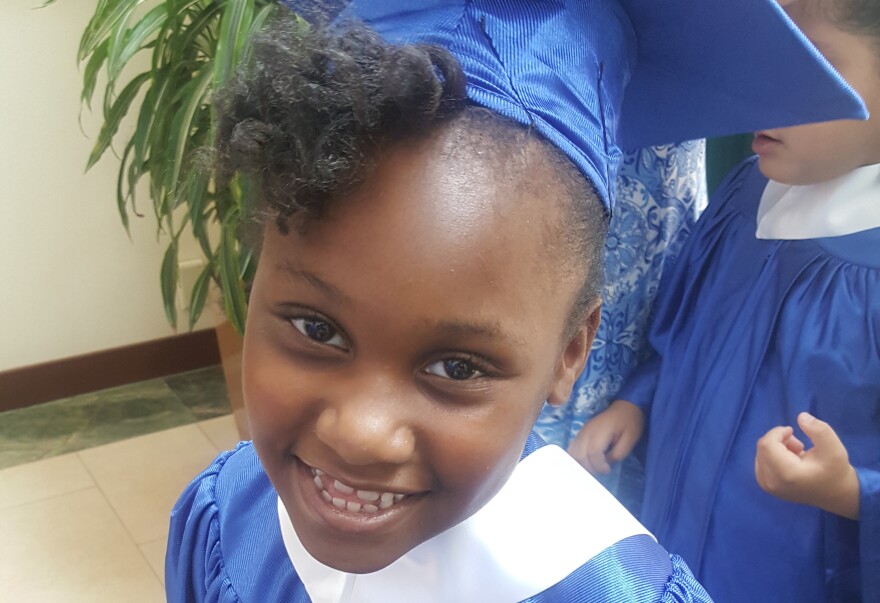Research by the Brookings Institution shows that poor children do worse in school partly because their families have fewer financial resources, but also because their own parents tend to have less education and higher rates of single and teen pregnancy.
A national home based early learning program with chapters in Florida is aiming to level the playing field.
Albrina Hendry is perched on the sofa of her small living room in Tampa, as her granddaughter sits on the floor watching cartoons and eating a snack. When Haleigh Green takes the last bite of a bagel, Hendry gets up, turns off the TV, and the pair begins the serious business of homework.
"What is 8 take away 6? Hendry asks.
Haleigh thinks and walks through the problem: "8 take away 6 is 2," she says.
“That’s good,” her Granny replies.
In August, Haleigh graduated from HIPPY, which stands for "Home Instruction for Parents of Preschool Youngsters." She was just 3-years-old when Hendry signed them both up for the early learning program that taught her how to do lessons like the one the pair now does every day after school.
"And now I'm big," says Haleigh. “And I go to school and I'm 6 years old now."
For three years, a trained worker came to their home to role play lessons with Hendry. In the HIPPY program, parents teach kids about numbers, letters, shapes and colors and instruct them how to follow directions and pay attention. The adults are taught techniques to engage children in the material. And they also get tips on how to react if their child makes a mistake, a skill Hendry wished she had when her own kids were growing up.

"I was tough, you know? I was a tough mom” she says. “So, with Haleigh and HIPPY, I get a chance to learn how to do it the correct way.”
Hendry chokes up and reaches for a Kleenex when Haleigh comes up to her, pats her shoulder and says, “Don't cry Granny, don't cry.”
Brenda Brinson is the Program Director for HIPPY in Hillsborough County. She says the biggest difference between HIPPY and better-known programs like Head Start, is that one on one emphasis between parent and child.
"That is a very positive part of the model,” she says. "Because when you carve out that time for the child, especially in a family where you have multiple kids and you're working with that child every single day, and you know (you tell them,) 'This is our HIPPY time. This is our time together,' - their child sees them in a different light.
"You're not just mommy or dad, you're my teacher," Brinson said.
Or in Haleigh's case, grandmother is the teacher.
"She's perfect, Haleigh says.
Mary Lindsey, the State Director of HIPPY Florida, says getting to children before they start school is critical. It's her job to get that message out to poor families, some who don't realize that teaching is a part of parenting.
“Because once they're in school and (the children) don't have the background, it is much more difficult to remediate, to catch up, to tutor,” Lindsey says. “The research shows that brain development is critical at age 3. By the time they are 5, those windows are closing."

There are currently 129 HIPPY programs operating in the United States; including 14 in Florida, from Miami-Dade County to the Panhandle. Each program is funded separately, but most use a combination of local, state and federal money.
Luckily for Hendry and her granddaughter, the Children's Board of Hillsborough County has been consistently supporting the program for years. The average cost in the county is between $2,000 to $3,000 per child. That includes the salary of the trainer, all school materials, and in Hillsborough, wraparound mental health services.
Lindsey says her biggest challenge outside of finding money is getting more families to even know HIPPY exists, and how important early learning is.
'Whatever you're teaching at home the good, the bad, and the ugly and the smart, she said "That's what they are going to be.”
And for Haleigh, that meant showing up for first grade, knowing basics like the alphabet and having someone at home to read with and to make them feel special.




